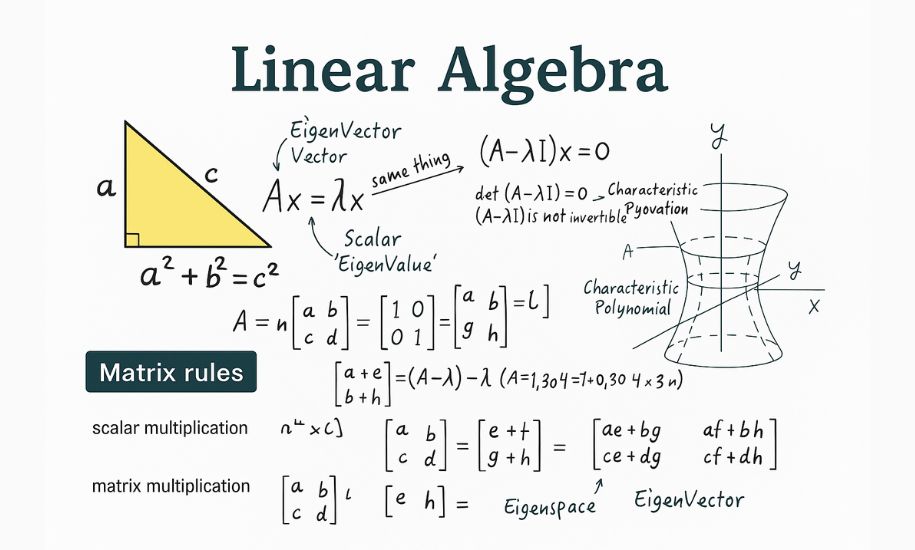Linear Algebra stands as one of the cornerstones of modern mathematics, essential not just for theoretical research but also for practical applications in computer science, physics, data science, economics, and engineering. For students at the University of Madras, understanding this subject is not just an academic requirement — it’s a gateway to advanced mathematical thinking and real-world problem-solving.
Whether you’re a budding mathematician or a curious learner seeking to simplify complex concepts, this article explores how Linear Algebra University of Madras is taught, what the curriculum includes, and how students can learn it more easily under the theme “Linear Algebra Made Easy.”
An Overview of Linear Algebra University of Madras
The University of Madras, one of India’s oldest and most prestigious educational institutions, offers comprehensive mathematics programs at both undergraduate and postgraduate levels. Among its core offerings is the Linear Algebra course, found prominently in the syllabi of B.Sc. Mathematics and M.Sc. Mathematics programs.
📘 Undergraduate Curriculum
For B.Sc. Mathematics students, Linear Algebra is introduced as a core subject typically in the third year, sixth semester. This course covers foundational elements that are crucial for higher mathematics:
- Vector Spaces: Students are taught about vector sets, linear combinations, linear independence, basis, and dimension.
- Dual Spaces and Inner Product Spaces: The curriculum includes advanced structural properties, making students familiar with orthogonality and projections.
- Linear Transformations and Matrices: This section delves into operations, representations, diagonalization, eigenvalues, and eigenvectors.
- Canonical Forms and Jordan Forms: These topics help learners understand matrix equivalence and simplification methods.
This curriculum is aligned with standard university-level textbooks like:
- “University Algebra” by N.S. Gopalakrishnan
- “Topics in Algebra” by I.N. Herstein
The University of Madras ensures a balance between theoretical knowledge and computational techniques, encouraging students to think critically while solving complex algebraic problems.
Advanced Linear Algebra: Postgraduate Focus
At the M.Sc. level, the focus shifts towards abstract and advanced algebraic structures. Postgraduate students explore:
- Bilinear and Quadratic Forms: These concepts extend the idea of vector interactions.
- Linear Algebra Over Fields and Rings: These abstract generalizations are crucial in modern algebra and cryptography.
- Modules and Module Homomorphisms: Students are introduced to more general linear structures beyond vector spaces.
This course structure ensures that students at the University of Madras are not only prepared for academic research but also for industry-based applications in data analytics, machine learning, and operations research.
Additionally, the Ramanujan Institute for Advanced Study in Mathematics (RIASM) under the university contributes cutting-edge research and faculty expertise to the curriculum, giving students the opportunity to engage with real-world mathematical problems.
Linear Algebra Made Easy: Tips to Simplify Learning

Despite its wide applications and significance, Linear Algebra can be an intimidating subject for many students. Here’s how learners — especially those at the University of Madras — can make “Linear Algebra Made Easy” a reality:
1. Use Visual Tools
Linear Algebra is highly geometric in nature. Concepts like linear transformations, basis changes, and eigenvectors can be understood more clearly with visual aids. YouTube channels like 3Blue1Brown provide animated content that makes even the most abstract ideas visually intuitive.
2. Break Down Definitions
Instead of memorizing definitions such as “a vector space is a set closed under addition and scalar multiplication,” understand them through examples:
- Vectors in 2D and 3D space
- Real-world analogies like force, motion, and economics
Understanding the why behind definitions will build a strong conceptual base.
3. Practice Matrix Operations with Real Data
Instead of using random numbers, try matrix operations with real datasets (e.g., sports stats, image data, etc.). It enhances practical understanding and shows how linear algebra powers applications in AI, finance, and computer graphics.
4. Use Software Tools
Programs like MATLAB, Python (NumPy), and Wolfram Alpha allow you to compute complex operations like matrix inversion or eigenvalue computation instantly. For University of Madras students, integrating this technology with academic learning can boost both speed and confidence.
5. Solve University Past Papers
Students should practice extensively with University of Madras question papers and internal assessment problems. These papers follow a unique style of questioning, and familiarity with them can significantly boost performance.
Linear Algebra Beyond the Classroom
What makes Linear Algebra powerful is its utility across disciplines:
- In computer science, it’s the foundation of algorithms, graphics, and machine learning.
- In engineering, it’s vital for system modeling and signal processing.
- In economics, it simplifies multi-variable modeling and statistical analysis.
- In data science, PCA (Principal Component Analysis), a dimensionality reduction technique, is based on eigenvalues and eigenvectors.
For University of Madras students, these applications are introduced through electives, research projects, or even final-year dissertations. The faculty often encourages application-oriented learning — bridging the gap between theory and practice.
Resources for Linear Algebra Made Easy
Here are some trusted online resources for anyone wanting to simplify the learning process:
- BetterExplained.com – Offers intuitive guides on vector spaces and transformations.
- Khan Academy – Beginner-friendly video series with practice problems.
- EntechOnline’s Starter Kit – A crash course titled “Linear Algebra Made Easy” simplifies vector math and matrix thinking.
- 3Blue1Brown’s “Essence of Linear Algebra” – A stunning visual series highly recommended for both B.Sc. and M.Sc. students.
Conclusion: Making Linear Algebra Work for You
The University of Madras provides an academically rigorous yet conceptually balanced approach to teaching Linear Algebra. From foundational topics in B.Sc. to abstract structures in M.Sc., the journey through this subject is well supported by experienced faculty and world-class resources like RIASM.
By leveraging visual learning, real-world applications, and smart study strategies, Linear Algebra Made Easy is not just a phrase — it’s an achievable goal. Whether you’re aiming for academic excellence or industry relevance, mastering Linear Algebra University of Madras is a critical step in that direction.
This article is published by Pure Acad, your trusted resource for academic insight and university-level content.









